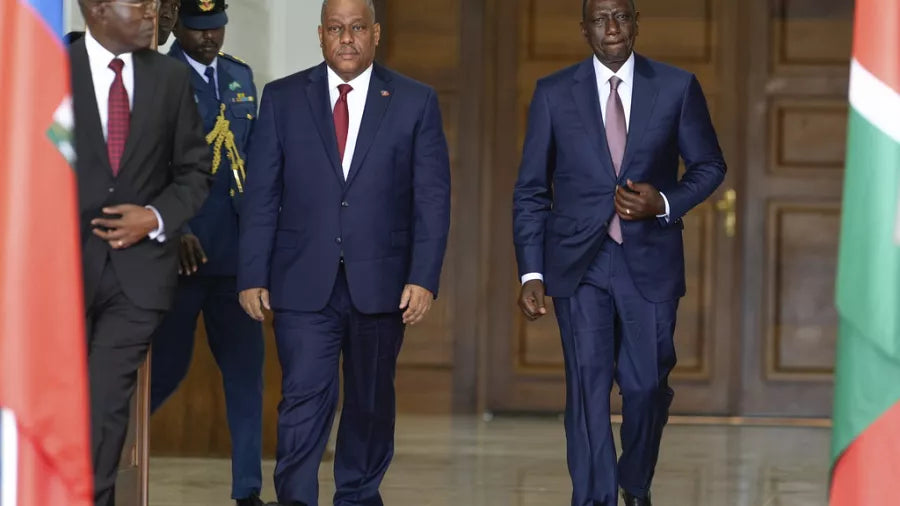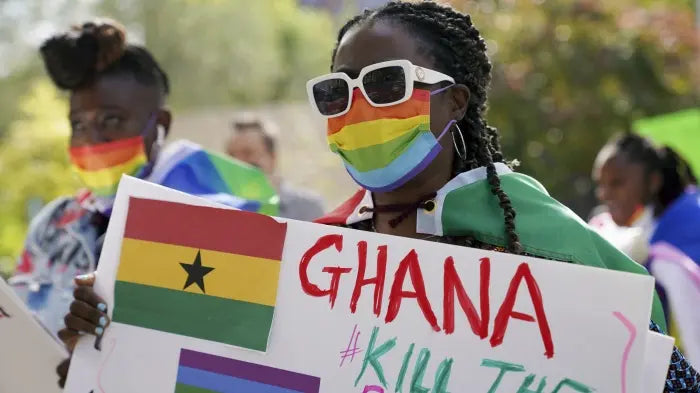
Ruto reaches out to Haiti: meeting with the Prime Minister for an African mission in the Caribbean
Kenyan President William Ruto welcomed Haitian Prime Minister Ariel Henry to Nairobi for an unprecedented meeting. At the heart of the meeting was the deployment of a Kenyan security force to Haiti to help the country restore order in the face of violence by armed gangs that are spreading terror in the streets of Port-au-Prince and elsewhere. This initiative, supported by the United Nations, marks a key moment for Kenyan diplomacy and questions Africa's growing role in resolving international crises.
Haiti in distress, Kenya to the rescue?
The streets of the Haitian capital have become the scene of unbearable violence. Gangs control up to 80% of Port-au-Prince, and the Haitian state is on its knees, unable to regain control. Kidnappings, sexual violence and assassinations are the daily lot of millions of people trapped in a climate of terror. Ariel Henry, often criticized for his inability to restore order, sees international intervention as a lifeline for his country.
It was against this backdrop of desperation that President Ruto took the decision to respond to Haiti’s call. In July 2023, Kenya offered to send a 1,000-strong police force to support local forces, a move endorsed by the UN Security Council in early October. For Nairobi, the move was not just a humanitarian gesture, but a clear signal of the role Kenya intends to play on the world stage: as an actor capable of leading decisive interventions beyond its regional borders.
Ruto took the opportunity to reaffirm his country’s commitment to promoting peace and security, while calling for international financial and logistical support to ensure the success of the mission. He also stressed that Kenya’s contribution was only part of a comprehensive strategy to restore lasting stability to Haiti.
The political and security stakes of the Kenyan intervention
While Kenya’s gesture may seem altruistic, the political ramifications of this intervention should not be overlooked. For President Ruto, it is about reinforcing Kenya’s image as a security linchpin in Africa and beyond. Having played a crucial role in mediation efforts in Ethiopia and South Sudan, Nairobi is seeking to extend its influence beyond the African continent.
However, intervention in Haiti is fraught with risks. The country is a security quagmire where international peacekeeping missions have often failed. The last major UN intervention, conducted from 2004 to 2017 in the form of the United Nations Stabilization Mission in Haiti (MINUSTAH), ended in accusations of human rights violations and the spread of cholera. By agreeing to lead a new force in Haiti, Kenya is running the risk of seeing its own contingent become mired in a complex conflict, where armed gangs are sometimes better equipped than the security forces.
Ruto will also have to deal with domestic criticism, with some Kenyans arguing that their government should first address national security concerns before embarking on foreign adventures. The threat of Al-Shabaab terrorist attacks and ethnic conflict in northern Kenya remain major challenges for the country.
African diplomacy facing global challenges
The Kenyan initiative also heralds a new era for African diplomacy. Traditionally relegated to receiving aid or playing secondary roles in international missions, African countries are now showing that they can be proactive actors in managing global crises. Kenya is no longer simply hosting negotiations on its soil; it is also exporting its vision of peace and security. The intervention in Haiti marks a turning point for the continent, offering a counter-narrative to the traditional portrayal of African nations as passive recipients of Western interventions.
For Ariel Henry, this meeting with Ruto in Nairobi is of strategic importance. He is seeking to gain the support of the international community to stabilise his country, but also to legitimise his government, which is being contested by an opposition that calls it illegitimate. By allying himself with Kenya, he hopes to show that he is prepared to do whatever it takes to bring peace, even if it means calling on foreign forces.
However, it remains to be seen whether the Kenyan intervention can provide concrete solutions to Haiti’s problems, which are deeply rooted in decades of poor governance, extreme poverty, and repeated foreign interference. The challenges are immense, and the history of international interventions in Haiti is full of failures. For this initiative to succeed, it will need to focus not only on restoring order, but also on supporting local institutions and establishing long-term development programs.
Between hope and skepticism: what future for Haiti?
Kenya’s intervention, while hailed by some as a courageous move, has also been met with skepticism. Haitians themselves have often expressed distrust of foreign interventions, which they see as forms of disguised neocolonialism. This distrust is understandable, especially given the history of international missions in the country, which have sometimes made matters worse.
It is clear that for Kenya, this mission is an opportunity to rehabilitate its image on the world stage and consolidate its position as a security leader in Africa. For Haiti, it is a risky bet that could either help the country turn a dark page in its history or reopen old wounds.
In any case, this meeting between William Ruto and Ariel Henry marks a pivotal moment for relations between Africa and the Caribbean. The deployment of Kenyan forces in Haiti symbolises a reversal of the trend: Africa, long the object of international interventions, is now asserting itself as an actor capable of providing solutions to global problems.



Leave a comment
This site is protected by hCaptcha and the hCaptcha Privacy Policy and Terms of Service apply.